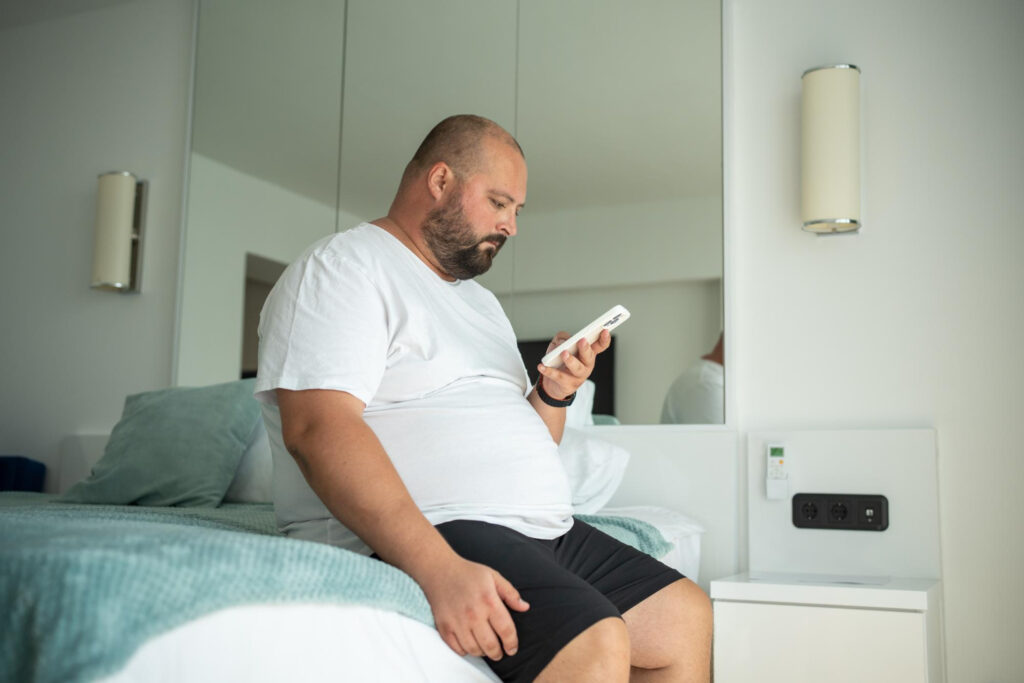
What Does Low Testosterone Do to a Man?
Low testosterone can significantly impact a man’s life. This crucial hormone is vital in various bodily functions, affecting your energy levels, mood, and overall well-being. When testosterone levels drop, it can lead to a variety of health issues that can influence your quality of life.
There are effective treatments available for low testosterone, including medical therapies and natural methods to boost your levels. Early detection and proper management can make a significant difference in improving your health. By understanding the impacts of low testosterone and seeking appropriate treatment, you can improve your overall quality of life.
Understanding Testosterone and Its Role in Men’s Health
Testosterone is a hormone produced primarily in the testicles. It plays a key role in men’s health and development. From puberty onwards, testosterone drives physical changes like muscle growth, body hair, and a deeper voice. This hormone is crucial for maintaining muscle mass, bone density, and red blood cell production. It also influences mood, sexual function, and overall energy levels.
Normal testosterone levels vary by age. In young men, levels usually peak in their late teens to early twenties and gradually decline as they age. By the time a man reaches his forties, testosterone levels may decrease by about 1% per year. Knowing your testosterone levels can help you understand what’s normal for your age and identify any potential issues early on.
Maintaining healthy testosterone levels supports not just physical health but also mental and emotional well-being. Low levels can lead to a variety of symptoms that impact your quality of life. Understanding these levels is important for anyone looking to improve their health and wellness.
Common Causes of Low Testosterone
One of the most common causes of low testosterone is aging. As men get older, their testosterone levels naturally decline. This gradual decrease can start as early as in their thirties.
Medical conditions like obesity, diabetes, and hormonal disorders can also lead to low testosterone. These health issues often disrupt the body’s ability to produce or use testosterone effectively. Addressing these conditions can sometimes improve testosterone levels.
Lifestyle factors such as stress, poor diet, and lack of exercise can impact testosterone production, too. High stress levels and unhealthy eating habits may lower testosterone. Regular physical activity and a balanced diet can help maintain healthier levels.
Certain medications and substance abuse can also be culprits. Medications used to treat chronic conditions like hypertension and depression may affect testosterone levels. Substance abuse, including alcohol and drugs, can also harm hormone production. Being aware of these causes can help you take steps to manage or prevent low testosterone.
Physical Effects of Low Testosterone in Men
Low testosterone can have many effects on a man’s body. These include:
Decreased Muscle Mass and Strength
Low testosterone can make it hard to build and maintain muscle. Even with regular exercise, you might notice a decline in muscle mass and strength. This can affect your physical performance and make daily activities more challenging.
Increased Body Fat
Low testosterone can lead to weight gain, especially around the abdomen. Men with lower levels sometimes develop gynecomastia, which involves enlarged breast tissue. This condition can be both physically uncomfortable and emotionally distressing.
Low Energy and Fatigue
Feeling tired all the time despite getting enough rest can be a sign of low testosterone. This constant fatigue affects your stamina and ability to engage in physical activities. Reduced energy levels can make staying active and enjoying daily life difficult.
Hair Loss and Skin Changes
Men with low testosterone may experience thinning body and facial hair. Skin can also become dry or thinner. These changes may not be harmful, but they can be noticeable and affect self-esteem.
Mental and Emotional Effects of Low Testosterone
Aside from physical effects, low testosterone can also have mental and emotional effects.
Mood Changes and Depression
Low testosterone can cause mood swings and increased irritability. Feelings of sadness or hopelessness can also arise. These emotional changes can be challenging for both you and your relationships.
Difficulty Concentrating and Memory Loss
Low testosterone can contribute to brain fog and forgetfulness. You might find it harder to focus on tasks or remember things. This can impact your work and daily life, making even simple activities frustrating.
Poor Sleep Quality
Proper rest is crucial, but low testosterone can disrupt sleep patterns. You may experience insomnia or frequent waking during the night. Lack of quality sleep can worsen fatigue and impact overall well-being. Regular sleep is essential for mental and physical health.
Understanding these mental and emotional effects is important. It helps in recognizing when it’s time to seek medical advice. Symptoms like mood swings, memory loss, and poor sleep quality are not just part of aging; they can be addressed and managed with the right care.
Sexual Health Impacts of Low Testosterone
Low testosterone significantly impacts sexual health. These issues often cause significant distress and affect relationships.
Reduced Libido and Sexual Desire
Men with low testosterone often experience a reduced interest in sexual activity. This decreased desire can strain relationships, causing feelings of inadequacy and emotional distance between partners. Addressing libido changes with medical help can restore both your sexual health and relational harmony.
Erectile Dysfunction (ED)
Low testosterone can lead to difficulties in achieving or maintaining an erection. Testosterone influences blood flow and arousal, making it crucial for optimal erectile function. If you struggle with ED, understanding that low testosterone might be the cause can guide you toward the right treatment and relief.
How to Diagnose Low Testosterone
Diagnosing low testosterone involves recognizing symptoms, seeking medical advice, and interpreting test results.
Recognizing early warning signs is the first step. Symptoms like fatigue, mood swings, reduced muscle mass, and decreased libido suggest it might be time to consult a doctor. Being proactive can lead to early detection and treatment.
The importance of medical evaluation and blood tests cannot be overstated. Doctors will assess your symptoms and take a blood test to measure testosterone levels. Accurate diagnosis helps ensure that you receive the appropriate treatment.
Interpreting testosterone test results is essential for understanding your condition. Normal testosterone levels vary by age and individual factors. Your healthcare provider will help you understand what your specific results mean and discuss the best course of action for treatment.
Treatment Options for Low Testosterone
Once diagnosed, several treatment options are available. These range from medical therapies to lifestyle changes that can help boost testosterone levels.
Testosterone Replacement Therapy (TRT)
TRT is a common treatment for low testosterone. It comes in various forms, such as injections, gels, patches, and pellets. TRT helps restore normal testosterone levels, which can improve symptoms like fatigue, low libido, and mood swings. However, discussing the potential risks with your doctor is essential, including possible side effects and long-term implications.
Natural Ways to Boost Testosterone
Aside from medical treatments, natural methods can also help increase testosterone levels. Diet and nutrition play a critical role; consuming foods rich in zinc and vitamin D can be beneficial. Regular exercise, especially strength training, helps boost hormone production. Managing stress and improving sleep quality are also essential. These lifestyle changes can have a significant impact on your overall testosterone levels and well-being.
Risks of Ignoring Low Testosterone
Ignoring low testosterone can lead to severe long-term health issues. Recognizing and addressing these risks is crucial for maintaining overall wellness.
Long-term health complications from untreated low testosterone include osteoporosis and heart disease. Low testosterone can reduce bone density, increasing the risk of fractures. It can also negatively impact heart health, contributing to cardiovascular issues.
Emotional and relationship strain is another significant risk. Symptoms like mood swings, irritability, and decreased libido can create tension and misunderstanding in personal relationships. Addressing these issues can improve not just your health but also your social and emotional well-being.
Decreased overall quality of life is a common consequence. Untreated low testosterone can lead to constant fatigue, reduced physical performance, and general dissatisfaction with life. Early detection and proper treatment can prevent these outcomes and help you lead a healthier, more fulfilling life.
Understanding these risks highlights the importance of seeking medical advice and exploring treatment options. Your health, relationships, and quality of life are worth the effort to address low testosterone promptly.
FAQs About Low Testosterone
Here are answers to some common questions about low testosterone.
Can Low Testosterone Be Reversed?
Low testosterone can often be managed or even reversed, depending on the underlying cause. Lifestyle changes like improving diet, increasing exercise, and reducing stress can help. Medications or testosterone replacement therapy (TRT) are also effective options. A healthcare provider can guide you in choosing the best approach for your situation.
At What Age Does Testosterone Start to Decline?
Testosterone levels typically start to decline around the age of 30. This decline continues gradually over time. However, various factors, like lifestyle and health conditions, can influence how quickly or slowly testosterone levels decrease.
Is TRT Safe for Long-Term Use?
When monitored by a healthcare professional, TRT is generally considered safe for long-term use. It’s important to have regular check-ups and lab tests to ensure the treatment is working effectively and safely. Discuss any concerns with your doctor to ensure the best possible outcome.
How Quickly Do Treatments Show Results?
Results from low testosterone treatments can vary. Some men start noticing improvements in energy and mood within a few weeks. Physical changes, like increased muscle mass, might take a few months. Consistent follow-ups ensure the treatment is effective and adjustments can be made as needed.
Why Choose RISE Men’s Health for Low Testosterone Treatment?
When it comes to treating low testosterone, RISE Men’s Health offers personalized care tailored to each patient’s needs. Our medical professionals specialize in men’s health, ensuring you get expert advice and treatment.
Personalized Care and Treatment Plans
At RISE Men’s Health, we understand that each person is unique. We offer customized treatment plans that consider your lifestyle, medical history, and personal goals. This personalized approach increases the chances of successful outcomes.
Experienced Medical Professionals
Our team includes experienced healthcare providers who focus on men’s health. Their expertise ensures that you receive accurate diagnoses and effective treatments. With years of experience, our team is equipped to handle various aspects of low testosterone treatment.
Focus on Patient Education and Long-Term Wellness
We believe in educating our patients about their health. Understanding your condition and treatment options empowers you to make informed decisions. We also focus on long-term wellness, helping you maintain healthy testosterone levels and overall well-being.
Taking Control of Your Testosterone Health
Understanding low testosterone and its effects is the first step toward effective management. Addressing this condition involves recognizing the signs, seeking professional help, and choosing the right treatment plan. With personalized care and expert guidance, you can overcome the challenges of low testosterone and reclaim your well-being.
RISE Men’s Health is committed to providing comprehensive and personalized care for low testosterone treatment. Our experienced team focuses on patient education and long-term wellness, ensuring you receive the best support on your health journey. Contact RISE Men’s Health to schedule a consultation about low testosterone treatment and start your path to improved health and vitality. Experience the benefits of expert care and regain control of your life.

Jessica is from the Dallas-Fort Worth area. She graduated from Texas Tech University with a Bachelor’s in Psychology and a minor in Nutritional Sciences. She then went on to obtain her Master of Medical Science from Lincoln Memorial University-DCOM. For the past 8 years, she has specialized in men’s health and primary care and is passionate about improving her patient’s quality of life. In her free time, she enjoys spending time with her husband and daughter (and pups!), working out, target practice, hiking, traveling, and DIY home improvement projects.
